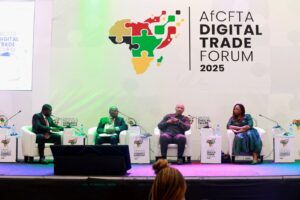The AfCFTA Secretariat alongside Zambia has inaugurated the first-ever AfCFTA Digital Trade and Services Forum in Lusaka, Zambia. This event signifies an important step for Africa as it advances towards establishing a cohesive digital marketplace.
Gathered with the theme “Enhancing Digital Commerce to Speed Up AfCFTA Execution,” the three-day forum assembled leaders, ministers, businesspeople, development collaborators, and creators from throughout Africa and elsewhere.
Hosted by the Republic of Zambia through the initiative of the AfCFTA Secretariat and led by President Hakainde Hichilema of Zambia, this forum acted as an essential hub for promoting collaboration and sharing insights aimed at accelerating the adoption of the AfCFTA Protocol on Digital Trade. This protocol was swiftly approved and praised extensively as one of Africa’s most progressive regulatory frameworks, setting robust groundwork for establishing a unified digital marketplace across the continent.
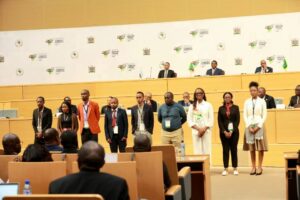
The forum was privileged to have His Excellency Duma Boko, President of the Republic of Botswana, in attendance. This involvement strengthened the unified political commitment throughout Africa to enhance digital trade integration within the framework of the AfCFTA.
During the Presidential Plenary, both leaders were joined by the Secretary-General of the AfCFTA Secretariat, H.E. Wamkele Mene, to explore ways the continent could harness the significant potential of digital trade as a catalyst for expansion, creativity, and accessibility.
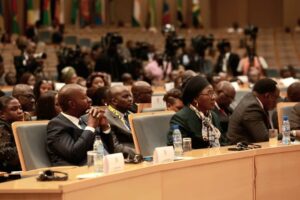
During his keynote speech, President Hichilema of Zambia reiterated the country’s dedication to becoming a frontrunner in Africa’s digital revolution. He emphasized the importance of closer cooperation between governmental bodies and the business community to foster equitable progress via enhanced digital commerce.
His appeal was seconded by H.E. Mene, who highlighted the importance of joint efforts in constructing digital infrastructures, attracting investments, and amplifying innovations.
Specialists urge immediate funding for digital infrastructure.
Approximately 1,500 attendees participated in the first-ever AfCFTA Digital Trade Forum held in 2025, which featured ten plenary and concurrent sessions addressing various subjects such as digital inclusivity for micro, small, and medium-sized enterprises (MSMEs), international transactions, management of data, AI applications, and strategies for generating revenue through online platforms.
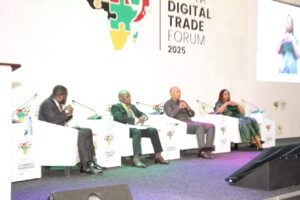
The conversations repeatedly highlighted the critical necessity of investing in compatible infrastructure, standardized rules, and training programs designed to empower young Africans, women, and small businesses to thrive in the digital era.
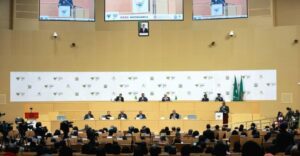
A significant milestone was reached when the AfCFTA Secretariat teamed up with the Google Hustle Academy to launch the AfCFTA Digital Skills and Entrepreneurship Program.
The program seeks to close Africa’s digital competency divide and foster a fresh cohort of business leaders. Additionally, the event recognized the leading ten contestants from the AfCFTA Digital Innovation Challenge, highlighting the significance of indigenous African innovations in propelling the economy’s advancement across the continent.

The panelists at the forum emphasized their commitment to advancing Digital Trade through the AfCFTA, ensuring secure economic progress throughout Africa. Key focuses highlighted include enhancing digital infrastructure, backing homegrown platforms, fostering digital skill acquisition, and implementing unified rules prioritizing both accessibility and safety. It was stressed that stakeholders should work towards making digital trade an engine for balanced economic expansion across the region.

The emphasis was placed on Africa’s potential to develop a prosperous digital economy that includes everyone and establishes itself as a worldwide frontrunner in innovation, resilience, and integration.
As Africa transitions from negotiations to implementation, the enthusiasm sparked in Lusaka establishes the sentiment that digital trade is not merely an aspirational goal for the future, but a crucial necessity of the present day.
The African Continental Free Trade Area (AfCFTA), which is a key initiative within Agenda 2063: The Africa We Desire, came into effect on May 30, 2019. Trading activities as per this accord began on January 1, 2021. This ambitious pact seeks to unite all 55 member states of the African Union, encompassing over 1.3 billion individuals in a single marketplace.
The AfCFTA encompasses a wide range of economic sectors across Africa, covering crucial aspects such as trade in products and services, digital commerce, investment safeguards, intellectual property rights, and competition policies, along with several others.
Through reducing obstacles to commerce across the continent, the AfCFTA aims to substantially enhance trade among African nations, with a particular focus on boosting the production of value-added goods and service industries. It is projected that this agreement could lead to an approximate 52.3% growth in intra-African trade via reductions in tariffs.
Provided by SyndiGate Media Inc.
Syndigate.info
).

